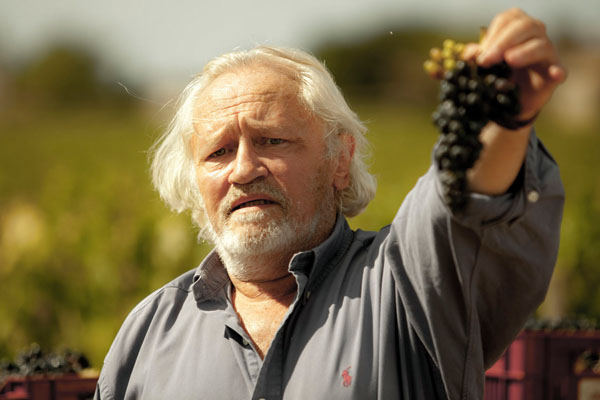Five minutes into You Will Be My Son (or Tu seras mon fils in its original French), I expected a very different film from the one that eventually emerged. The first scene takes place in a crematorium, as a coffin and its occupant are cooked to ashes. A relative of the deceased picks at a flower, and asks whether the ashes of the man and of the wood will mix. At which the funeral attendant leans over like a great crow to say, ‘It’s all just carbon.’ The whole thing seems
very poised, quite refined and a little bit clever.
But then the film turns into something else entirely. Its location switches to a vineyard in Saint-Émilion, where we are properly introduced to the owner, Paul de Marseul (Niels Arestrup), and his son Martin (Lorànt Deutsch). Paul is a pomaded, quilted brute, an expert in grapes and in expensive English footwear, and he is disappointed in Martin for not matching up. This leaves the two men glowering and raging at each other. Martin cries, fearful that he will be overlooked for promotion at the vineyard. You Will Be My Son starts to play like a Gallic episode of Emmerdale Farm.
And then, just to add to the soap opera, another son enters the frame — not Paul’s, but the son of his dying estate manager. This son, Philippe (Nicolas Bridet), is many of those things that Martin is not. He is self-assured, he cares about his shoes and, most importantly, he’s been helping to run a vineyard in America. Paul takes a liking to Philippe, and soon the two of them are — literally — sharing a hot tub full of grapes. What began as ‘You will be my son’ directed at Martin, has become ‘You will be my son’ directed at Philippe.
Throughout all this, the director Gilles Legrand rarely passes up an opportunity to slap us across the face with the themes of his film. There are too many examples to catalogue here, so let’s just say that there are plenty of shots with objects in between Martin and his father, cutting them off from each other. And we are frequently reminded that Philippe worked at the real-life Coppola vineyard in California — that’s Coppola as in Francis Ford Coppola, the director of The Godfather (1972), which just so happens to be another film about fathers and sons and the family business. Quelle coincidence!
And sometimes there’s a different sort of face-slappery. These are the moments when You Will Be My Son tips over almost into Grand Guignol, as when Martin rams a pair of secateurs into his hand, or when we discover that Paul sprinkles his own father’s ashes into the wine as a secret ingredient. Indeed, there is one dream sequence that wouldn’t be out of place in a Roger Corman or Mario Bava movie: a maniacal Paul keeps dunking Martin in and out of a vat of wine, with the screen all crimson. Part of you thinks, ‘Alright, we get the point, they’ve got father-son issues.’ The other part of you thinks, ‘Yeah, craaaaazy!’
This is not, I’m sure, the response that the filmmakers were seeking. In many respects, You Will Be My Son is a competent film that aims for seriousness: it is well acted, beautifully shot and has a few things to say about tradition and the maintenance of it. And yet without its excesses and unintentional qualities, it would also be much more forgettable. What’s another family drama set in the sun-baked South of France, particularly during these dark days of early winter? That’s certainly not what I’m in the mood for. But one that involves death by wine fumes? That’s much more like it.
Which is why I can’t agree with those pun-happy film critics, such as those of Le Figaro, who described You Will Be My Son as being of a ‘very fine vintage’. Nor with those who have called it ‘full-bodied’ and ‘complex’. For me, it’s closer to a can of cream soda than to a bottle of wine — more to my particular tastes, perhaps, but not necessarily that good. So if that’s your sort of tipple too, then just tear back the ring-pull and drink.






Comments